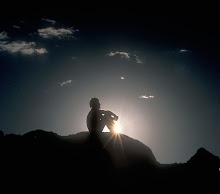My mother said, “You won’t amount to anything because you procrastinate.” I said, “Just Wait”.
- Judy Tenuta
The human mind is always caught up in a ceaseless and random train of thought (not entirely comprehensible at times). We think about various things as we go along, heck we even think about thinking about other things never quite understanding what exactly to do about them.
Every day of my existence on this planet I vow to myself something or the other, from the ridiculously mundane to the absolute serious. But there are a very things I actually ACT upon. I may blame it on a variety of reasons like my callousness, surroundings or extreme apathy, but at the end it all boils down to the ability to transform thought into action(s). Its said that when really want something, all your thoughts, efforts, actions etc will orient themselves in a manner so as to achieve the desired target, which in a way is saying that the END gives rise to the MEANS. This may not be totally false but to achieve that necessary jumpstart, the choices we make play an important role. What we choose is how how we define our future life path. We may choose to indulge in day dreaming and philosophize or we may choose to step out of the comfort zone and ACTUALLY do something about it. Thinking is easy, acting is tough and to be able to convert the desired thought into the necessary set of actions, well that is the toughest task of all.
When we first decide to make positive changes in our lives, we usually underestimate the amount of effort it will take. It's easy to dream and imagine a better life, but we also need to give form to our thoughts with decisive action. And nothing that is ever worth having comes easy. That's where most of us get stuck.
We need to use the same process to "build" the lives we want. We need to be clear on what we want (conceive the idea), draw up plans (set goals), and then take action to form our desires in the physical.
What most of us do (including me), however, is say we want to change, but then act in ways that contradict that desire. There can be many reasons for this, such as the lure of old habits, fear of some past failure, or low self-worth. Until we resolve the underlying issues, we will keep sabotaging our efforts to change.
Sometimes just making up your mind to get cracking isn’t enough. What hampers the road ahead is deciding the COURSE of action. How do we choose whether the task we’re going to perform will result in an advancement to the ultimate goal? How to categorize an act as been conducive or destructive to our chosen end? When I think of this I think of the “Resolution Theory” mentioned Gregory David Roberts’ book “Shantaram”. It basically centers around the concept of the universe continuously moving towards increasing complexity ending in an an ultimate complexity. He also uses it to lend objectivity to the concepts of Right and Wrong. As per the theory, anything that helps move towards this ultimate complexity is good, and anything that inhibits it is bad. Simple, and yet, fascinating! If we also judge our every action by this line of thought by equating the ultimate complexity as being the desired target, we’ll function in a much better, efficient and coherent manner. The mistake most of us make is that we include unnecessary parameters in our lives and decision making process. These useless criterion tend to be things like religion, superstition, what others think of you etc. We tend to distort our hindsight to the point that the way forward no longer remains clear. When we need to decide on what to do and how to go about it, we must solely judge on the barometer of whether this act will lead us towards our target or away from it. At times its not at all easy to judge each step with this philosophy but if we endeavor to try and stick to it as much as we can we can see things in better perspective.
But at the end there is no one answer to all of our problems. The goals we set and the path we take are very subjective matters that ultimately we have to decode ourselves. Whenever we begin to flounder or doubt the path chosen, it never harms to remind ourselves that there’s never a wrong time to do a right thing!







